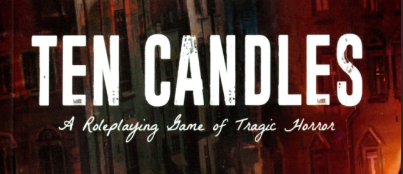Some of the best ideas come from players loudly announcing their theories. :) For a different approach, think about what fear or horror trope you want your players to feel and focus on that, rather than any specific details about Them. Like the feeling of being hunted, body horror, not knowing who to trust, etc.
- 0 Posts
- 8 Comments
Part of the game’s appeal is the mystery of the unknown, so it’s important to not get to detailed in explaining what They are. However, I think you’ve nailed the major categories. I think you’re painting with too broad of a brush though. “Aliens” can cover a wide range of themes. Little green men, John Carpenter’s Thing, Xenomorphs, 40k’s Dark Elder, Cthulhu Mythos creatures, higher dimensional beings, all of these could be considered alien, and would fit the role of Them, but their motivations and behavior would play out quite differently.
I agree, this reads like a reporter interviewing someone to get them to define terms they made up. This didn’t sell me on why I should want to use one style of play over another, just wistful “torturing” themself wondering if anyone still uses this mysterious style of play. It’s not mysterious. As you said, it’s just Play to Find Out.
I think it would be more useful to show the strengths and weaknesses of PtFO and as well as more scripted gameplay, because each has a place in RPGs, and knowing when to use one over another is a great skill for GMs to practice.
 1·2 年前
1·2 年前I would avoid running any combat where the party is forced to lose. That would make any time spent on it feel like a waste. A short narrated vision would be fine, but if you want to make this a bigger encounter, you should give the party a goal that they can actually accomplish. I can think of a few ways you could do this:
- The party could locate survivors among the dead to gain information about what happened.
- Survey the wreckage, the party could use investigation skills to look at debris and piece together what happened. Think, crime scene investigation on a grand scale.
- The BBEG may be showing a true vision of the future, but not a complete vision. Perhaps there is something that the BBEG is trying to hide, such as a clue to how to defeat them. For example, the party could use some kind of magic detection to see through an illususory water fountain and reveal a magic MacGuffin or a person who knows the BBEG’s weakness.
I’ve been using the Pathfinder 2E Beginner Box, and it’s the first time I’ve run a premade adventure. I’ve been customizing it quite a bit in terms of the story to better match my players. I expected the adventure to feel stale and on-rails, but what I found was that it gives you a safe baseline to work from. If you find any parts of session planning stressful, you can just leave them at the baseline and devote more of your time toward the things you actually enjoy.
In my case, I was still learning the system, so it was nice not having to worry about balancing encounters, drawing maps, or distributing treasure. Instead, I was able to spent my prep time on modifying the story.

 3·2 年前
3·2 年前I’m in the exact same boat. I’d like to use some of the monster lore and trying to convert the action oriented bosses to be used in PF2e. I’m thinking it would be pretty easy to just treat the Villain Actions as costing two actions in Pathfinder. I think the minion rules would transfer over as well.

 0·2 年前
0·2 年前Looks like I’m little late for this one. How’d your game go, OP? For anyone else, I’ve played in a couple games and GMed a few as well. Here’s what I’ve learned:
- As Leokadia said, learning into the ceremony is important. It’s all too easy for players to break the tension with jokes, and the ceremony helps maintain that feeling of solemness.
- Whenever a candle goes out, feel free to fast forward to the next scene where something dramatic will happen. I didn’t do this, and just kept going into the next moment. After the fact, I felt like things would have been more interesting if I had kept things moving.
- it’s easy to forget, but remember that everything is dark. Your players will need to figure out how to see where they are going. If you need a quick way to ramp up tension, you can threaten their light source. Don’t do this too often though.
- Take a bathroom break before play begins. It sucks when you have to pause the game at a tense moment, and then you may be faced with the fact that a light or two went out in your absence

I’ve found this trope works best when all players know the secret, but the characters don’t. If it’s a cool, interesting secret, everyone can play into it and enjoy the dramatic irony.